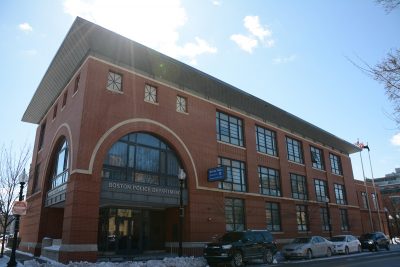
Boston Mayor Martin Walsh and Boston Police Commissioner William Evans announced the addition of a new class of 20 cadets to the Boston Police Cadet Program as part of the Fiscal Year 2018 budget proposal, according to a press release from Walsh’s office.
The cadet program, reinstated last year, is a paid, full-time, two-year apprenticeship that helps recruit and train new generations of police officers, said Boston Police Department Lt. Detective Mike McCarthy.
Last year, at the time of the program’s reinstatement, 42 citizens were chosen for the cadet program, according to the release.
With around half of these cadets expected to matriculate into the police force, McCarthy said this next round of cadets is expected to fill any leftover positions.
“It’s a way for us to keep a pool of candidates ready to go,” McCarthy said. “As each group matures, they’ll matriculate at that two-year mark.”
Beginning in the fall, McCarthy said the BPD will begin processing applications for this new class, at which point 20 eligible applicants that pass the standard entrance exam and background check will begin their term as cadets.
McCarthy said the program lets the BPD assess candidates while simultaneously allowing candidates get a feel for police work.
“[The program] allows for city residents to come in and see if a career in law enforcement is for them,” McCarthy said. “It’s also an opportunity for us to evaluate the candidates over those two years as to whether or not we think they’re going to be a qualified police officer.”
Due to the requirement of a 5-year residency in Boston, McCarthy said he believes the program will act as a “talent pipeline” of future officers that could improve diversity in the lower ranks of the police force.
“It’s a way for us to recruit and hire kids from the neighborhood who represent the diversity of the city,” McCarthy said. “At the completion of their two years of service, they get a hiring preference through civil service, similar to that of a veterans’ preference, so that we can move to put them on the police department in a permanent capacity.”
McCarthy also said he believes there is a correlation between the instatement of the cadet program and the recent citywide decrease in violent crime, which has been down by 6 percent in the first quarter of this year, according to the release.
“[Through the program] we really get people who are committed and have had a chance to really evaluate whether or not they want to go,” McCarthy said. “That translates into a better police officer, which in the end can contribute to decreasing crime.”
One of the crimes mentioned in the release is rape and attempted rape, which has decreased by 19 percent over the last year in Boston, according to the release.
Contrary to the trend reported in the release, Katia Santiago-Taylor, a manager of system advocacy at the Boston Area Rape Crisis Center, said BARCC has recorded a recent increase in sexual assault survivors accessing their services in the Greater Boston area.
Santiago-Taylor said she believes the discrepancies between these findings could be attributed to the fact that not all rape victims report their assaults.
“I think the data is interesting,” Santiago-Taylor said. “I don’t necessarily think that the crime itself [rape and attempted rape] might be down, it’s just the reporting might be down.”
Santiago-Taylor said BARCC has had good experiences with the BPD, with officers actively involved in helping them support survivors of sexual assault.
“It’s a very positive relationship,” Santiago-Taylor said. “They bring survivors to us when survivors are seeking our services, and if a survivor that we’re working with would like to report a sexual assault, we can collaborate with the BPD to provide accompaniments.”
However, Santiago-Taylor said there is still work to be done to improve collaboration between BARCC and the BPD.
“Like every system there’s always room for growth,” Santiago-Taylor said, “We’re definitely collaborating with them to create greater materials for police officers [to deal with sexual assault].”
Several Boston residents shared their support for the BPD’s efforts to more accurately reflect the voices of the community through the cadet program.
Linda Thiem, 29, of Dorchester, said the BPD’s presence in her neighborhood makes her feel safe.
“I see them at the train stations, and when I’m walking home late at night I see them driving around,” Thiem said. “I think it’s to give this idea that we’re safe … to create this sense of security.”
Nevon Porter, 19, of Dorchester, said diversifying the BPD would improve their interactions with residents.
“If you have different police from different backgrounds, with citizens from different backgrounds, they’ll connect more with each other,” Porter said.






















































































































